DOWNLOAD
That is Reina’s favorite band. The group consists of four young East Germans. It’s called “Tokio Hotel”. Identical twins Bill and Tom were born in the year of the fall of the Berlin Wall. Their dream was [to play] a concert in far away Tokyo. They already released their first CD when they were teenagers. After that they received countless awards in their home country and abroad. Beyond Germany’s borders they also became more well-known worldwide.
*Reina speaking Japanese*
Voice-over: Tokio Hotel war der Anlass für Reina auch ins Showgeschäft einzusteigen. Endlich ist der Traum der Band in Erfüllung [gegangen]. Wird die Band auch Japan im Wirbelsturm erobern?
Tokio Hotel were the reason for Reina to also get into the show business. Finally the band’s dream came true. Will the band also take Japan by storm?
Tokio Hotel *clinking glasses over meal*: Auf „Tokio Hotel” im Tokio Hotel. *jokingly pretending to be drinking something posh* Hmmm.
To “Tokio Hotel” in a Tokyo hotel. *jokingly pretending to be drinking something posh* Hmmm.
Bill: Delicious.
Gustav and Tom: Guter Tropfen.
Splendid wine.
Voice-over: Hier wartet schon jemand.
Here’s somebody already waiting [to meet them.
Reina: Ich stehe vor einem Tokioter Hotel um „Tokio Hotel“ zu treffen. Also, kommt mit!
I’m standing in front of a hotel in Tokyo to meet “Tokio Hotel”. So come along!
Voice-over: Es kommt zum langersehnten Zusammentreffen mit Tokio Hotel.
The eagerly awaited meeting with Tokio Hotel is happening.
Bill: Hi. Hello. Hi.
Reina: Hallo. Hallo.
Hello. Hello.
Bill: Nice to meet you. Bill.
Reina: Ich kann Deutsch. Ich kann Deutsch.
I know German. I know German.
Bill: Oh. Hi.
Tom: Tom
Reina: Hallo. Guten Morgen.
Hello. Good morning.
Bill: Guten Morgen.
Good morning.
Reina: Vor, erm, drei Jahren hab’ ich vier Jahre in Wien gewohnt.
Erm, I’ve lived in Vienna [Austria] for four years [until] three years ago.
Bill: Ah.
Reina: Genau. Deshalb kenn’ ich euch und ich war wirklich ein großer Fan von euch.
Exactly. That’s why I know you and I was really a big fan of yours.
Tom: Sehr gut. Danke schön.
Very good. Thank you.
Bill: Oh, vielen Dank.
Oh, thank you very much.
Voice-over: Reina, anfassen ist okay!
Reina, it’s okay to touch!
Reina: Ihr heißt ja “Tokio Hotel” und ich hab’ gehört, dass ihr schon immer in Tokio spielen wolltet.
So, you’re called “Tokio Hotel“ and I’ve heard that you’ve always wanted to play in Tokyo.
Bill: Oh, ist ganz ungewohnt wieder Deutsch zu sprechen.
Oh, it’s quite unusual to be speaking German again.
Georg: Ja. Yes.
Bill: Erm eigentlich war’s ’n bisschen so, dass wir uns, erm, uns so’n Ziel gesetzt haben damit auch. Darum haben wir uns Tokio ausgesucht als Stadt, weil wir dachten “Ok, das ist wirklich weit genug weg. Das ist unerreichbar.“ Vor allem klingt es auch gut irgendwie. Für uns war auch der Sound so wichtig.
Erm, actually it was a bit like we set ourselves a goal with it as well. That’s why we chose Tokyo as a city because we thought “Ok, that’s really far enough. That’s out of reach.” Above all it also sounds good somehow. Like, the sound [of it] was also important to us.
Reina: Und ihr seid ja mit die erfolgreichste Band. Also, der deutschen Bands der letzten 20 Jahre.
And after all you’re one of the most successful bands. Well, of the German bands from the past 20 years.
Bill: Das es dann so erfolgreich wird, das war wirklich, erm, totaler Zufall. Wir haben auf jeden Fall den Vorteil, dass wir wirklich ‘ne ganz natürlich geformte Band sind. Also, wir haben uns wirklich selber kennen gelernt und sind halt echt gute Freunde auch. Ich glaube, das ist so’ne Sache, die man, erm… die einen auf jeden Fall verbindet und die das auch ‘n bisschen speziell macht.
It was really a total fluke that it ended up being so successful. We’ve definitely got the advantage that we really are a band that formed totally naturally. Meaning, we really got to meet each other on our own and we’re also just really good friends. I think that’s just one of the things that one, erm… that definitely connects us to each other and it’s also what makes it a bit special.
*“Durch den Monsun“ live at Tokyo showcase*
Voice-over: Ihr Durchschnittsalter ist 22 Jahre. Um mehr über die jungen Stars zu erfahren, hat Reina etwas vorbereitet.
Their average age is 22 years. Reina prepared something to get to know the young stars better.
Reina *presenting pink box*: Da sind so Zettel drinnen und auf den Zetteln sind Stichwörter drauf.
That’s got, like, pieces of paper inside and there’s a keyword written on each one.
Bill: Okay. *getting first piece of paper out of box, reading it out* “der Urlaub”
“holiday”
Reina: Was macht’s ihr? Was würdet ihr machen, wenn ihr ab morgen eine Woche Urlaub hättet?
What are you doing? What would you do if you had a week’s holiday starting tomorrow?
Bill: Ich würde sofort ‘nen Flug auf die Malediven buchen.
I’d immediately book a plane ticket to the Maldives.
Tom: Ja. Wenn wir Urlaub haben, dann ist immer mehr so relaxen und gar nichts… gar keine Anstrengungen unternehmen sozusagen. Und darum lagen wir immer auf den Malediven rum und haben eigentlich gar nichts gemacht, außer vielleicht mal Jetski fahren zwischendurch.
Yes. When we’re on holiday then it’s always about relaxing and [doing] nothing… not making any efforts so to speak. And that’s why we were lying around the Maldives and actually didn’t do anything, except maybe jet skiing every now and then.
Georg *picking next piece of paper*: Das nächste? “das Haustier”
The next one? “pet“
Reina: Ich hab’ gehört, ihr habt alle Haustiere.
I’ve heard all of you have got pets.
Tokio Hotel: Ja. Yes.
Reina: Und zwar… Hunde?
Namely… dogs?
Bill: Hunde. Und zwar viele. Tom und ich haben vier.
Dogs. And many at that. Tom and I have got four.
Reina: Vier?! Four?!
Bill: Tom und ich haben vier Hunde, ja. Das war immer so’n Zufall. Wir wollten die dann quasi retten vorm Tierheim und wollten irgendwie sie so’n, so’n bisschen beschützen und eigentlich weiter vermitteln.
Tom and I have got four dogs, yes. That was always such a coincidence. We basically wanted to save them from the animal shelter and wanted to somehow protect them a bit and actually find a new place for them.
*Georg laughing*
Bill: Und wie das dann so ist, wenn sie erst mal da sind, dann kann man sie nicht mehr hergeben und jetzt sind’s vier mittlerweile. Ich kann mir aber auch noch mehr Hunde vorstellen.
And the thing that’s always happening is that you no longer give them away once they’ve been with you and so it’s four [dogs] by now. However, I could also imagine [to have] more dogs.
Reina: Ach so.
I see.
*up next: “die Deutschen” – “the Germans“*
Bill: Tom und ich zum Beispiel sind immer sehr pünktlich. Ich hasse warten und ich bin sehr ungeduldig. Also, so’n… Ich glaub’, da… Das sagt man den Deutschen auch so’n bisschen nach, dass sie immer sehr, sehr pünktlich sind.
For example, Tom and I are always very punctual. I hate waiting and I’m very impatient. Well, like… I think, it’s… That’s also a little something that Germans are said to be. That they’re always very, very punctual.
Reina: Was ist das Gute an Deutsch?
What’s so good about German?
Bill: Das ist natürlich unsere Muttersprache. Man hat so’ne, so’ne besondere Verbindung dazu. Natürlich, ne? Und erm, darum, wenn wir, wenn wir dann gerade so weit weg sind und wie mit dir jetzt Deutsch reden können, dann freut uns das natürlich mal zwischendurch. Das ist dann schon was Besonderes.
Of course it’s our mother tongue. So one’s got a special bond to it. Needless to say, right? And erm, that’s why being able to speak German the way we are with you now naturally just makes us happy from time to time when we’re so far away [from home]. That really is something special then.
Tom: Schon gut, ja.
Quite good, yes.
Voice-over: Super, Reina!
Voice-over: Die Bandmitglieder erregen in der Musikbranche und in der Modewelt große Aufmerksamkeit.
The band members attract a great deal of attention in the music industry and fashion world.
Reina: Und heute habe ich für euch…
And today I’ve got […] for you.
Voice-over: Welchen Tokioter Trend empfiehlt das beliebte Model Reina?
Which one of Tokyo’s trends does the popular model Reina recommend?
Bill: Sind die echt?
Are they real?
Reina: Nein, die sind nicht echt.
No, they’re not real.
Bill: Au, das ist gut!
Ow, that’s good!
Reina: Die sind nicht echt.
They aren’t real.
Georg: Für’s Auto, ne? Zum, erm… an den Spiegel…
[That’s] for the car, right? To, erm… [attach] to the mirror.
Reina *laughing*: Nein, das ist nicht für’s Auto.
No, that’s not for the car.
Bill *snatching the black one out of Georg’s grasp*: Ich will ‘n Schwarzen!
I want the black one!
Reina: Nicht für Autos. Erm, das ist so was… man hängt das da *showing* zum Beispiel.
[It’s] not for cars. Erm, that’s like… you put it here for example.
Voice-over: Sie schenkt der Band bei Oberschülerinnen populäre Fuchsschwanzanhänger.
She’s giving the band foxtail tags that are popular with high school girls.
*talking underneath voice-over*
(Bill: […] so was total […] aber das ist nicht echt?
[…] these things totally […] but that’s not real?
Reina: Fell ist nicht echt. Natürlich.
The fur isn’t real. Of course [not].
Bill: Oh, das ist gut.
Oh, that’s good.)
Tom *looking at foxtail*: Aber sicher das [ist’s nicht]?
But you’re sure [it’s not]?
Bill: Und als Ohrring, Georg. *holding it up to Georg’s ear*
And as an earring, Georg.
*Georg teasing Gustav*
Gustav *telling him off*: Georch! Geh weg… weg damit.
Georch! Get away… get that away.
Bill: Vielen Dank.
Many thanks.
Reina: Bitte schön.
You’re very welcome.
Voice-over: Zum Schluss verrieten die Bandmitglieder ihr Lebensmotto.
In the end the band members revealed their motto in life.
*Bill writing*
Tom: Ja. Whoo.
Yes. Whoo.
Bill *holding up what he wrote down*: Kann man das lesen?
Is it readable?
Reina *reading it out*: „Leb’ die Sekunde“.“Lebe die Sekunde”. Ja.
“Live every second“. Yes, [it’s readable].
Tom: […] und mich oft dran erinnern muss, dass ich das auch wirklich… dass man das auch wirklich macht, weil… Also, ganz oft ist es ja einfach so, dass man so viel am Arbeiten ist, dass man, erm… ja, gar nicht daran denkt jede Sekunde zu genießen und zu leben, so.
[…] and often have to remind myself that I really… that one really has to do it because… Meaning, very often it’s just a case of working so much that one, erm… yes, [that one] no longer thinks about enjoying and living every second.
Bill: Manchmal muss man dann sich dran erinnern: „Wir sind grad in Tokio!“, ne?
So sometimes one has to remind oneself: “We’re in Tokyo right now!”, right?
Reina: Ja, genau.
Yes, exactly.
Bill *turning around, looking out of window*: Muss man mal rausgucken aus’m Fenster und dann merkt man mal wieder: “Wow!”
One has to look outside the window from time to time and to then realise once again: “Wow!”
Voice-over: Heute wurde in Tokio ein Traum erfüllt. Unvergesslich ab der ersten Sekunde.
Today a dream came true inTokyo. [It was] memorable from the first second on.











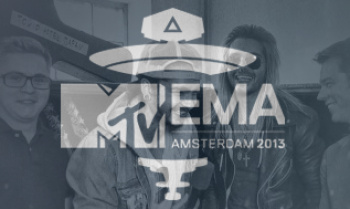


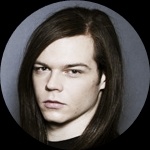





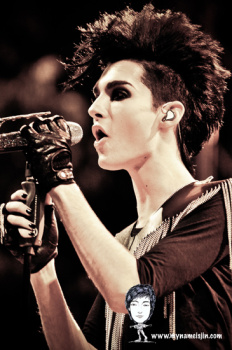










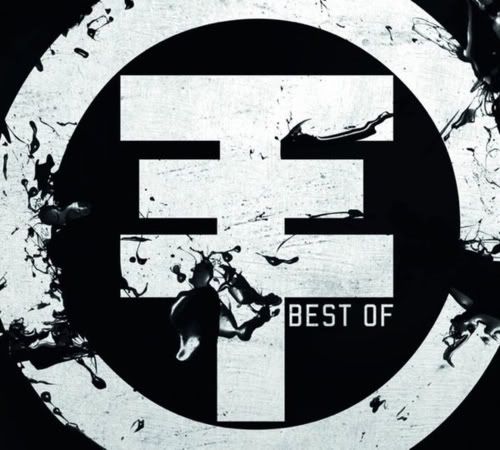




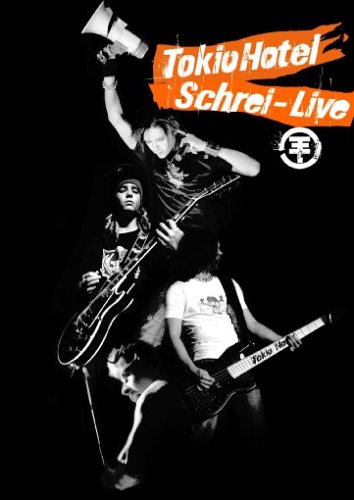
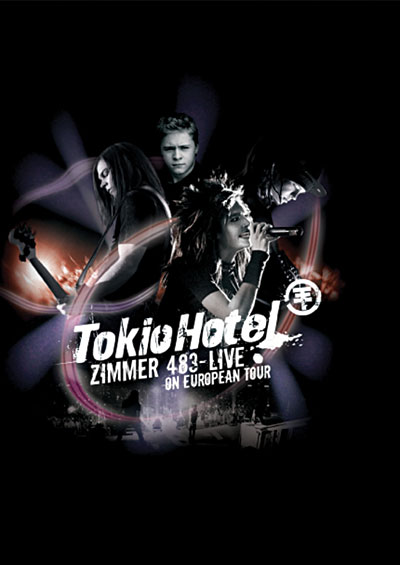


Thank you for posting the German and English! I think there is just one mistake: Reina is not saying "Ich kann Deutsch, ich kann Deutsch," she is saying "Ich kenn' Deutsch, ich kenn' Deutsch." The verb "kenn'" is a shortened version of "kenne" which is a variant of "kennen," To Know.
ReplyDeleteBut it is so cool to be able to read what they are saying in German. My German isn't good enough that I don't need the English translation, but I'm getting better!